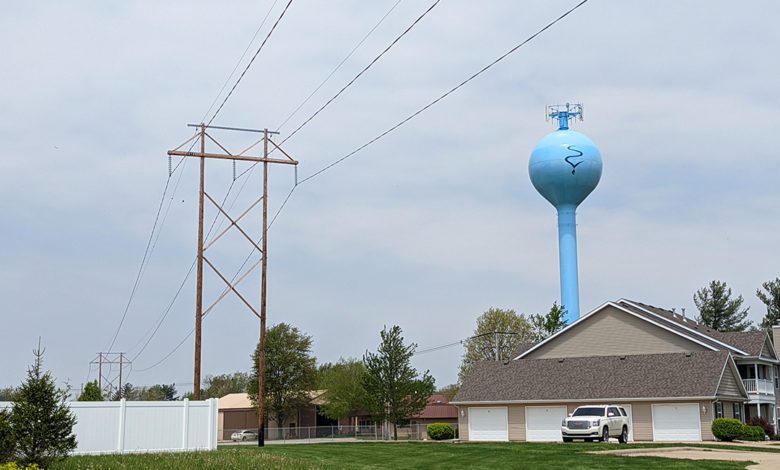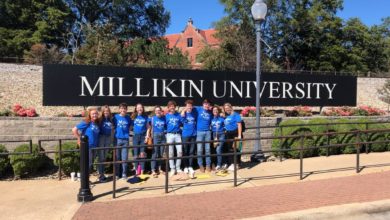SVPWD hires Veolia North America to manage operations

By Dani Tietz
The Sangamon Valley Public Water District Board on April 5 approved a contract with Veolia North America to manage operations of SVPWD water and wastewater systems that serve Mahomet residents north of I-74 and east of IL-47.
The $1.358 million-per-year contract secures a licensed management and operations team for five years. The contract hands all day-to-day operations, including employee management and compensation, costs associated with operations, administrative, laboratory, and clerical tasks, over to Veolia.
Typically, Veolia only signs 10-year contracts with public systems because of the infrastructure they dedicate to the resource. However, because a new board will be seated at the beginning of May, they agreed to a five-year contract with SVPWD.
The urgency to find licensed water and wastewater professionals became urgent after June 2022, when former board member Bud Parkhill spearheaded an effort to make all seven seats of the SVPWD board elected positions instead of appointment by the Champaign County Board, as was past practice.
For some, looking at the 2023 candidate list signaled a change in district leadership. All seven seats were uncontested and to be filled with people who had never been part of the board before. But to the district employees, the majority of the names on the list were individuals who had either confronted them in the past or had direct ties to Parkhill.
In December, employees began talking about leaving the positions they held within the district. Then, after learning about a conversation Parkhill had signaling he was still involved in some ways on a board level, two key employees, ones with the required license to operate the district’s water and/or wastewater supply, submitted their resignation letters in early April.
In an April 3 resignation letter Plant Operator Kurt Smith wrote, “I will be resigning due to a number of reasons stemming from the long-term corruption of this water district and town alike. I will not be involved with all the small-town politics that revolves around this district nor do I want to have my name slandered anymore like many others have before me. I have been cursed at or given inappropriate hand gestures by this ill-informed community brought up by LIES of the past board and future board too many times to count. I feel the new board has a pre-planned agenda for the water district which may involve some unethical dealings and I will not take part in any of it. Also, since hearing my job mostly consists of ‘signing paperwork’ I feel the new board coming on has little to no knowledge on what we do here day to day and will not be willing to bring on the staffing required to give me any chance of normal work-life balance.”
Smith was expected to leave the district on April 21 while General Manager Kerry Gifford planned to leave on May 1 “due to health problems created by an ongoing hostile work environment.”
The need to have a licensed operator became more urgent when Gifford quit his position on April 5.
In the months leading up to the vote, current board members saw a two-fold problem brewing.
First, with the vast majority of employees signaling they would leave under the new board, the district may not have the personnel needed to ensure adequate water and wastewater operations.
Second, the district would lose the two employees with the required licensure: Gifford holding water and wastewater and Smith holding water.
Illinois EPA requires each public district to employ an operator with the required licensure to regularly test the quality of drinking water. The operator checks for bacteria, metals such as chromium and lead, inorganic chemicals such as arsenic and nitrate, and organic chemicals including pesticides. All these contaminants can cause serious health concerns if they are present in excessive levels in drinking water.
When a licensed operator leaves, a district has approximately two weeks to find a replacement.
Board member Monte Cherry, who also has 30 years of experience as an engineer in water and wastewater projects and facilities, talked about the difficulty public and private water districts are having in finding licensed professionals at this time.
“We knew we were losing the top-level talent in the organization,” Cherry said. “If we were going to try to keep the management structure the way it is right now (prior to April 5), it would take forever. Again, I’m speaking from experience; in Danville we’ve tried to hire engineers and operators. These are certified people, and they’re just not out there. I mean it’s not like you’re getting qualified candidates to apply. You’re getting no candidates to apply.”
This reality, a 12- to 24-month search, has led some public water systems to sell to public entities while others have hired management companies, like Veolia, to address licensure, staffing, salaries, equipment management, and testing.
In years past, SVPWD has posted open positions without receiving applications from qualified candidates. Board Chairman Meghan Hennesy said the board also knew it needed to bring on a second licensed operator to prepare for the possibility of losing the one they employed.
“We’ve been working for more than two years to attempt to hire additional folks with licensing to ensure that we have backup and we were covered,” Hennesy said. And we had zero applicants prior to bringing IMRF on board because most people with experience are coming from organizations that have IMRF so they’re not interested at this point in their career going somewhere that they can’t move their retirement and continue that process.”
Until recently, SVPWD for many years also did not offer competitive salaries and other benefits to attract top-level employees.
Now, those responsibilities including attracting, keeping and educating employees belongs to Veolia.
“The idea was to put this professional management in place,” Cherry added. “They’re very large, very diversified. And this part of their business is very vibrant for them. They operate a number of facilities across the country. They’re not the only ones doing it either, so they don’t have a monopoly or anything. They are competitive and they realize that to stay in the business, they’re gonna have to do a good job.”
If Veolia does not meet the requirements put forth, there are options for SVPWD to void the contract.
Opponents of the contract, including board members Bob Buchanan and Mike Melton, said the contract ties the hands of the future board which has a four-year term.
With a $1.399 million budget for fiscal year 2023, Hennesy said the district will spend less money than it would have to operate the district within the previous structure it had.
During the March and April meetings, Buchanan presented a list of individuals and entities, including the Village of Mahomet, who, he believed, could sign off on testing as other employees ran the district. He also said the board should consider other vendors who submitted a bid to manage the district’s operations, even though those documents did not meet the RFQ deadline.
The individuals Buchanan mentioned do not have the appropriate licensure to operate a public water district, and Hennesy said it’s unlikely that another licensed operator would step in to sign off on testing that (s)he had nothing to do with.
This publication reached out to one of the men Buchanan named to see if anyone had talked to him about doing the work. The person confirmed that Bud Parkhill had reached out, saying that the board, which had not been seated or had not voted to direct Parkhill to act on its behalf, would be looking for an operator.
Though not directly, the man felt that Parkhill was asking him to take on that role. He declined, saying he was not a water or wastewater operator, and suggested that the district might look into a management company, as it is hard to find qualified candidates industry-wide.
Knowledge of this conversation, alongside Parkhill’s referendum to have the seats elected, exacerbated the concerns of current SVPWD employees, who had already spoken out about the mistreatment of past and a few current board members.
The majority of the current board believed hiring a management team with the required licenses set the district up to continue water and wastewater service should there be a disruption from employees leaving.
With Veolia, or any other management company, in charge of the day-to-day operations, a buffer was built between the board and future employees. After a week with Veolia, the current SVPWD employees, including Smith, have been hired to stay in their current positions.
With Gifford gone, Smith felt like he would be hurting the community should he take his operator’s license to another organization. He added that being employed by Veolia rather than Sangamon Valley Public Water District has made a huge difference in the working environment.
“I know things about the district that no one else knows,” Smith said. “These aren’t just things you can just learn.
“I’ve got a little bit more power backing me in decisions, and a lot of people to turn to to talk to and resources to help me.”
Smith now holds the title of Project Manager with Veolia. Currently, he has the required certification for water management, but will soon be able to be certified in wastewater management.
That opportunity for growth is not only in the cards for Smith. All employees have opportunities to advance their careers as Veolia provides continuing education opportunities at no cost to the employee.
“They have an academy. All of it is free to all the Veolia employees. The opportunities for the employees is endless.
“The classes they have are honored by the Illinois EPA, so anytime I need continuing education, I just log in and do a couple courses.
“They are big on training.”
In the first week of management, Veolia brought in its team to help understand the processes at SVPWD and to streamline the processes for employees and customers.
“They have a directive for everything that we are going to do,” Smith said. “I like that style of working.”
Staff has also appreciated Veolia’s commitment to fair compensation and benefits.
Veolia’s commitment to look for local employees was important to the SVPWD board.
“It’s very important that the money that is expended by the utility stay local as much as possible: that we hire local people, local contractors; that we utilize the local businesses wherever we can,” Cherry said. They intimately understand that and they do that wherever they go. They understand that that’s the nature of this business. They understand how important it is.”
While the operations and management tasks will be under the supervision of Veolia, the new SVPWD board will still be responsible for budgeting, setting water and wastewater rates, working with district engineers, and management of seven projects, including, but not limited to updating pipes in Briarcliff Subdivision and the sewer plant. SVPWD employees also have not had the proper licensing to do the work associated with laying pipes or to approve engineer design, so the board has approved contracts to do this work.
“Although I do want to set the new board up for success, I do not believe that our obligation is to new board members, our obligations to the district and the users and the people who go pay for water and expect the utility to run appropriately and safely.
“There was no other way to ensure safe water that we had available in the timeframe that we needed to work with.”
Cherry said the decision was not the ideal situation, but under the circumstances, was the best decision the board could make with the circumstances it had at the time.
“The ideal thing for the district would have been not to have to deal with this and to continue to try to develop the group that was there,” Cherry said. “They (the board and staff) were energized and they were doing a good job. And you know, the board had migrated to the point where they were not trying to manage the facility. The board was actually doing what you’re supposed to do. That would have been the ideal situation where they had all these good employees still in place and had a board that was operating in the interest of the people that they serve.
“I don’t know if the people will ever understand or be able to grasp the depths of what it took to assure that they would have continued services, essential services.”





